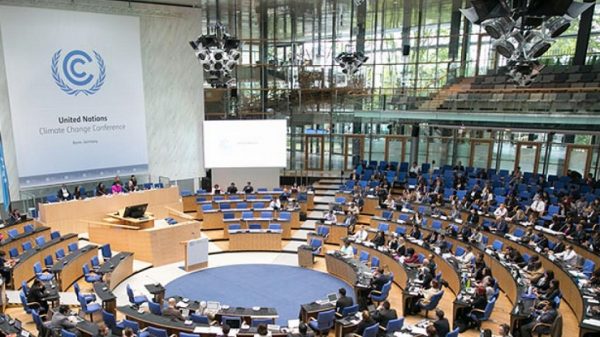Expectation from Upcoming UN Climate Conference

It’s just less than a month until climate delegates from all over the world will gather in Madrid, the capital of Spain. UN Framework Convention on Climate Change (UNFCCC) has confirmed that, the 25th session of the Conference of the Parties (COP 25) will move from Santiago, Chile to the Spanish capital due to social unrest in Chile. The conference will be convened from 2-13 December 2019 in Madrid. Around 25,000 people are expected to attend the event, including representatives from the governments, NGOs and businesses from all over the world. How Spain will pull it off is anyone’s guess, because hosting such an event in less than a month is a matter of huge task. Apart from the massive logistical puzzle, this year the most important climate conference in the world marks its 25th installment. Therefore, what are the expectations and how can we prepare for it?
Last December, leaders from all over the world gathered in Katowice for the 24th Conference of the Parties (COP 24) to finalize the rule book for the implementation of the Paris Agreement (PA). The rule book comprises detailed technical guidance on how parties plan, implement and review their climate actions to fulfill the promise of the Paris Agreement. COP 24 commissioned a new phase that refers to “Word to Action” – a deal on implementation of the Paris Agreement, yet there are some issues left unresolved, for example, finalisation of article 6, time frame for the implementation, transparency and action, integrating loss and damage within existing climate finance architecture, etc.
The COP 25 in Madrid will be informed by the outcomes of, among other meetings, the UN Climate Action Summit held in New York in September 2019, as well as three regional climate weeks in Africa, Latin America and Asia-Pacific. Recently, UNFCCC has released the agenda for the upcoming Climate Change Conference; among other issues: the Warsaw International Mechanism for Loss and Damage associated with Climate Change Impacts (WIM); market mechanisms; matters relating to finance, in particular long-term climate finance; capacity building; matters relating to least developed countries (LDCs); development and transfer of technologies; the forum on the impact of the implementation of response measures; gender and climate change; and the second review of the adequacy of UNFCCC Article 4 are expected to be discussed in Madrid.
Negotiations at COP .25 will primarily focus on the operational guidance for cooperative approaches provided for in Article 6 of the Paris Agreement, which refers to international carbon markets. It can be an important tool to help coordinate efforts to reduce greenhouse gas emissions between countries. The goal of cooperative approaches is to create opportunities for cost-effective mitigation to enable higher levels of ambition. Robust rules are needed to ensure that international carbon markets operate without ‘double counting’ of emissions reductions and deliver credible results. Another key agenda for the upcoming COP 25 is the effectiveness of climate finance, including the outcomes and impacts of finance provided and mobilised. The conference also agreed to discuss on the review of Warsaw International Mechanism on Loss and Damage – a directive to address loss and damage associated with impacts of climate change, including extreme and slow onset of events in developing nations that are particularly vulnerable to climatic impacts. With financial assistance, vulnerable developing nations can properly enhance their climate change risk management by assessing the impacts and identifying gaps and recovering from loss and damage they experience due to the adverse impacts of climate change. During COP 25, LDCs group will push forward the urgent need for rapid reduction in global emissions to avoid increased loss and damage due to climate change, and scale up support so that LDCs can adapt and build resilience.
“How dare you? To come here and say that you are doing enough,” Swedish teenage activist Greta Thunberg asked world leaders at the recent Climate Action Summit in New York. In just one year how she went from being one lonely protestor standing outside the Swedish parliament to a climate star joined by hundreds of thousands of people in cities worldwide demonstrates the urgency of immediate climate action. The involvement of youth in combating climate change is crucial and many are already taking action to reduce greenhouse gas emissions and to increase climate change resilience. So, youth engagement and their participation in climate action can be an important issue throughout the discussion.
It is high time to reduce greenhouse gas emissions and take climate action in all aspects. Despite the agreement of solid foundations to advance climate action, specific actions are needed to be adopted in the coming Madrid conference to fine-tune the Paris Rulebook. Spain is hosting the COP 25 in December with bigger ambitions as the United Nations Framework Convention on Climate Change (UNFCCC) is celebrating its 25th anniversary this year. Countries and other stakeholders should well prepare for the upcoming COP 25. Parties must not only restate but strengthen their commitment to communicate enhanced NDCs by 2020 and kick-off national inclusive and multi-stakeholder enhancement processes. Ministers, heads of delegation including civil society organisations and media should make best use of their time at Madrid identifying adequate responses to the climate emergency.
Researcher, Centre for Climate Change and Environmental Research (C3ER), BRAC University























Leave a Reply